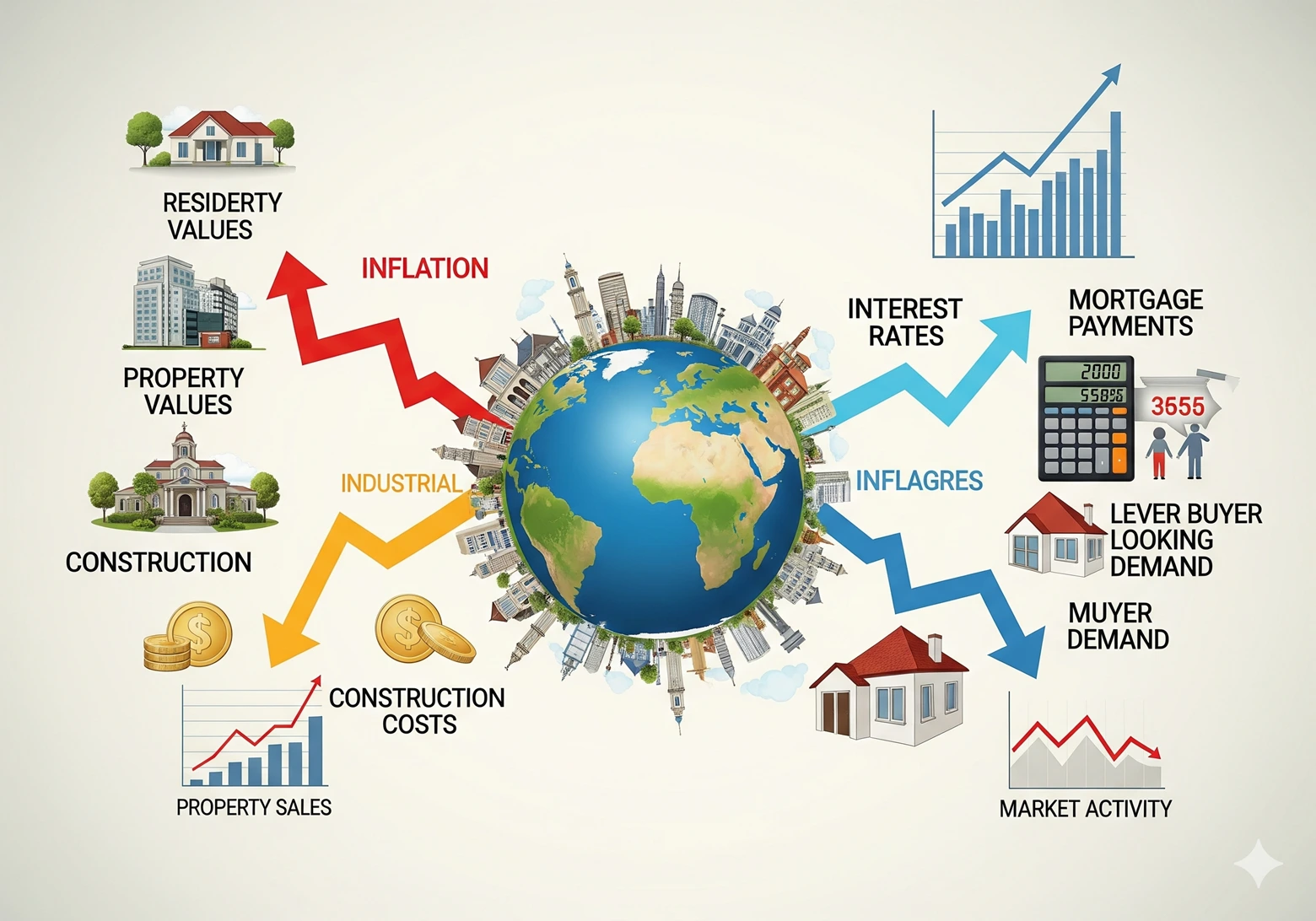Introduction
Real estate is one of the most sensitive markets influenced by global economic changes. Two key factors that directly shape property prices, demand, and investment are inflation and interest rates.
In 2025, many countries are still experiencing the after-effects of high inflation, while central banks are adjusting interest rates to stabilize their economies. These shifts are having a direct effect on the global real estate market—impacting homebuyers, investors, developers, and lenders.
This article explains how inflation and interest rates affect real estate, why they matter, and what opportunities and risks exist in 2025.

What Is Inflation and How Does It Affect Real Estate?
A rise in inflation, or the general increase in prices, leads to higher costs for everything from construction materials to labor and land. This directly results in more expensive new housing projects.
- Higher costs → Developers raise property prices.
- Reduced affordability → Buyers need more money to purchase homes.
- Rising rents → Landlords increase rents to match higher living costs.
- Hedge against inflation → Real estate often protects wealth since property values usually grow during inflation.
In short, inflation pushes housing prices upward, but it also makes affordability a challenge for average buyers.
How Interest Rates Influence the Real Estate Market
The cost of borrowing is determined by central banks through interest rates. This has a direct effect on mortgage rates, which in turn dictates how much a buyer pays each month for their loan.
- Low interest rates → Cheaper borrowing, higher housing demand, and rising property values.
- High interest rates → Costly mortgages, lower affordability, and slower real estate activity.
In 2025, many central banks are cautious. While some regions are cutting rates to support growth, others keep rates higher to control inflation. This mixed policy is shaping regional differences in property markets worldwide.
Global Real Estate Market Trends in 2025
1. United States and North America
- Current mortgage rates are notably higher than those observed prior to the pandemic.
- It has become increasingly difficult for first-time buyers to afford a house.
- Investors are shifting focus to rental properties due to strong rental demand.
2. Europe
- High energy costs and inflation have pushed up property expenses.
- Affordability for new buyers in the Eurozone remains a key issue due to interest rates.
- Luxury and sustainable properties are still attracting wealthy investors.
3. Asia-Pacific
- Countries like India and Vietnam are seeing strong housing demand despite inflation.
- China’s property sector is stabilizing after years of slowdown.
- Japan benefits from ultra-low interest rates, making housing finance cheaper.
4. Middle East
- Gulf countries continue to attract foreign investors due to tax advantages.
- Inflation is relatively lower, keeping real estate investment stable.
How Inflation and Interest Rates Impact Investors
For real estate investors, inflation and interest rates create both risks and opportunities:
- Rental Income Growth: In times of inflation, rents usually rise, creating more cash flow.
- Property Value Protection: Real estate often acts as a safe haven asset during inflation.
- Financing Challenges: High interest rates make borrowing costly, reducing returns.
- Regional Diversification: Investors may shift capital to countries with lower interest rates and stable economies.
Strategies for Buyers and Investors in 2025
- Focus on Rental Properties – Rising rents provide steady income streams.
- Look at Emerging Markets – Asia and Africa offer growth potential where housing demand is rising.
- Invest in Sustainable Real Estate – Eco-friendly buildings are gaining global demand and government support.
- A fixed-rate mortgage offers protection against any potential increases in interest rates.
- Diversify Internationally – Don’t rely on one country’s market; spread risk globally.
Opportunities vs. Risks
| Factor | Opportunity | Risk |
|---|---|---|
| Inflation | Higher rental income | Expensive property prices |
| Interest Rates | Lower borrowing costs when rates fall | Reduced affordability when rates rise |
| Global Market | Growth in emerging markets | Slowdown in developed economies |
FAQs
1. How does inflation increase property prices?
Because construction materials, labor, and land costs rise, developers pass these costs on to buyers, pushing property prices up.
2. Are high interest rates a negative factor for those who invest in real estate?
Not always. While financing becomes expensive, investors who own rental properties may still benefit from higher rental yields.
3. Where are the most attractive international real estate markets for investors in 2025?
India, UAE, Vietnam, and parts of Europe offer strong opportunities, depending on budget and strategy.
4. Does real estate protect against inflation?
Yes, real estate is commonly viewed as an effective hedge against inflation because property values and rental income usually grow as prices rise.
Disclaimer
Please consider this information for general knowledge only. It does not constitute financial or investment advice. Real estate markets are highly localized, so it is crucial to consult a professional advisor before making any investment choices.
Related Articles
- Real Estate Investing for Beginners: Build Wealth Smartly
- Top Guide for Global Investors: Buying Property Abroad
- Top Tips for First-Time Homebuyers in 2025-26
For more details on real estate investment trends, visit World Bank Housing Finance Insights

